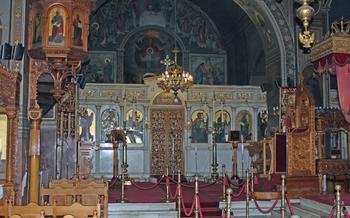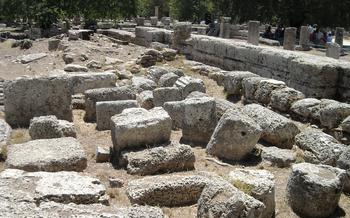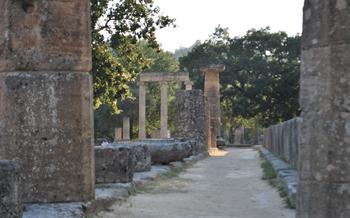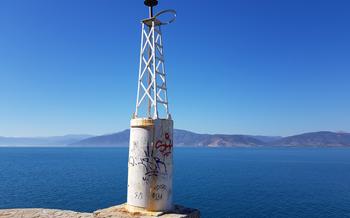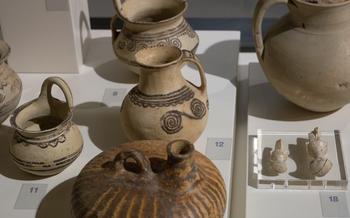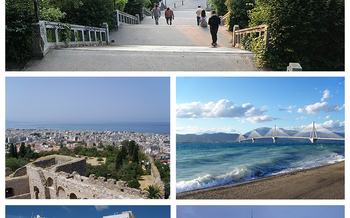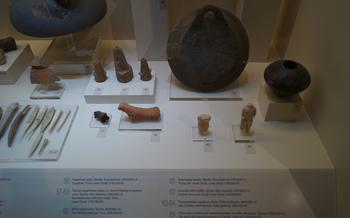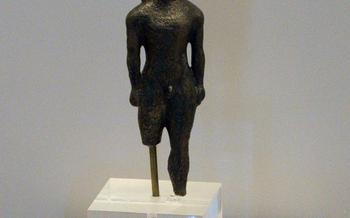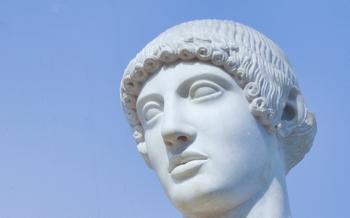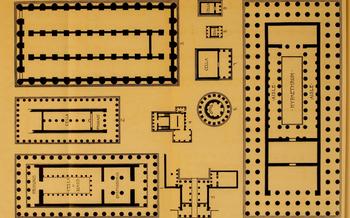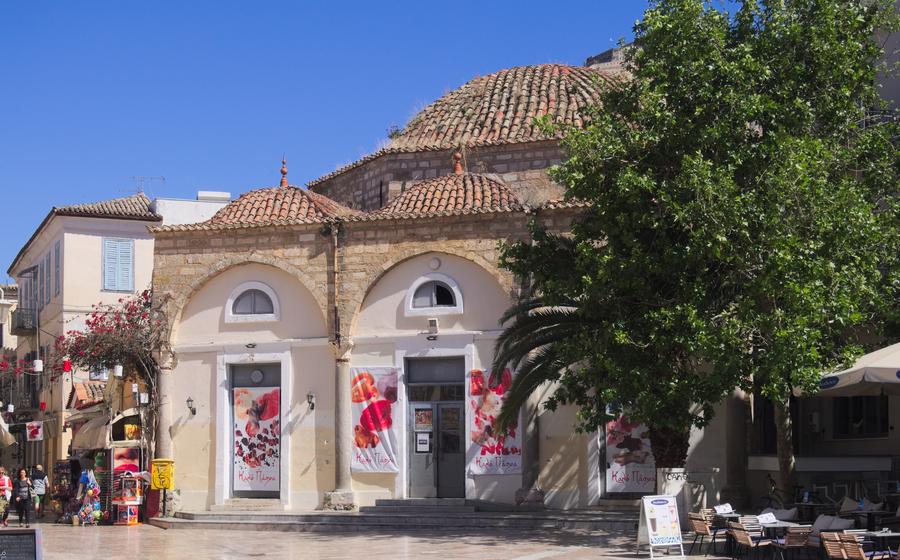
Ancient Tenea
- Historical Background
- Location and Getting There
- What to See
- Excavations and Discoveries
- Tips for Visitors
- Exploring the Surrounding Area
- Ancient Tenea in Greek Mythology
- Religious Significance
- Architectural Features
- Daily Life in Ancient Tenea
- Decline and Abandonment
- Modern-Day Tenea
- Tenea in Literature and Art
- Tenea and the Peloponnese
- Insider Tip
Historical Background
Ancient Tenea, nestled in the northeastern corner of the Peloponnese peninsula, boasts a rich and storied history dating back to the mists of antiquity. Its founding shrouded in the veil of mythology, the city is believed to have been established by Tenes, the son of Apollo and Arsinoe. As a religious and cultural epicenter, Tenea played a pivotal role in the region, hosting lavish festivals and honoring deities such as Apollo, Poseidon, and Asclepius. Its strategic location on the trade routes between the Peloponnese and Central Greece further propelled its significance, transforming it into a thriving commercial hub. Archaeological excavations have unearthed a treasure trove of artifacts, including intricate pottery, bronze sculptures, and inscriptions, shedding light on the city's vibrant past and its contributions to the tapestry of ancient Greek civilization.
Location and Getting There
Ancient Tenea is located in the northeastern Peloponnese, approximately 10 kilometers southwest of Corinth and 80 kilometers west of Athens. To reach Tenea from Athens, take the A8 motorway towards Corinth and exit at Corinth West. Follow the signs for Tenea, which is about 15 kilometers from the exit.
From other major cities in Greece, such as Thessaloniki or Patras, you can take the national highway towards Corinth and follow the same directions as above.
Public transportation options are also available. From Athens, you can take a bus from the Kifissos bus station to Corinth and then transfer to a local bus to Tenea. From other cities, you may need to take a combination of trains and buses to reach Corinth and then continue to Tenea.
Once in Tenea, the archaeological site is located on the outskirts of the modern village. It is well-signposted, and you can easily walk from the village center to the site.
For a more convenient and flexible option, consider renting a car. This will allow you to explore the surrounding area at your own pace and visit other nearby attractions, such as the Ancient Corinth site or the Temple of Apollo at Isthmia.
Here are the GPS coordinates for Ancient Tenea: 39667° N, 28333° E.
What to See
Ancient Theater:
The most striking feature of Ancient Tenea is its remarkably preserved theater. Built in the 4th century BC, the theater is one of the best-preserved examples of ancient Greek architecture in the Peloponnese. With a seating capacity of over 2,000 spectators, it hosted dramatic performances, musical concerts, and religious ceremonies. The theater's acoustics are exceptional, allowing even the faintest whisper to be heard from the stage.
Temples and Sanctuaries:
Tenea was home to several temples and sanctuaries dedicated to various deities. The most prominent temple was dedicated to Apollo, the god of healing and prophecy. The remains of this temple, including its imposing columns and intricate carvings, offer a glimpse into the religious practices of the ancient city. Other temples and sanctuaries were dedicated to Artemis, goddess of the hunt, and Asclepius, god of medicine.
City Walls and Fortifications:
The ancient city of Tenea was surrounded by a sturdy wall, parts of which are still visible today. These fortifications served to protect the city from invaders and provided a sense of security to its inhabitants. The walls were constructed using large blocks of stone, showcasing the advanced engineering skills of the ancient Greeks. Towers and gates were strategically positioned along the wall, allowing for effective surveillance and defense.
Excavations and Discoveries
Archaeological excavations at Ancient Tenea began in the late 19th century and have continued intermittently to this day. These excavations have unearthed a wealth of artifacts and findings that have shed light on the city's history and significance. Among the most notable discoveries are the well-preserved remains of the ancient theater, which date back to the 4th century BC. The theater is one of the best-preserved examples of its kind in Greece and provides valuable insights into the city's cultural and religious life.
Other significant discoveries include the remains of temples dedicated to various deities, including Apollo, Artemis, and Asclepius. These temples provide evidence of the city's religious significance and the diversity of cults worshipped in Tenea. Additionally, excavations have revealed the remains of city walls, houses, and other structures, offering a glimpse into the daily lives of the city's inhabitants.
Numerous artifacts, such as pottery, coins, and inscriptions, have also been found during excavations. These artifacts provide valuable information about the city's economy, trade relations, and cultural influences. Ongoing research and future excavations at Ancient Tenea promise to reveal even more about this fascinating ancient city, enriching our understanding of its history and significance.
Tips for Visitors
Plan your visit during the spring or fall months for pleasant weather and fewer crowds. The Mediterranean climate offers warm and sunny days throughout the year, but the summer months can be hot and humid. In the spring, the wildflowers are in bloom, and the landscape is lush and green. In the fall, the temperatures are mild, and the colors of the changing leaves are breathtaking.
Wear comfortable shoes and clothing for walking on uneven terrain. The archaeological site of Ancient Tenea is spread out over a large area, so be prepared for some walking. Sturdy shoes are recommended, as the paths can be rocky and uneven. Dress in layers so that you can adjust to the changing temperatures throughout the day.
Consider booking a guided tour or renting an audio guide. Guided tours are available on-site and can provide valuable insights into the history and significance of Ancient Tenea. Audio guides are also available for rent, allowing you to explore the site at your own pace while learning about its past.
Combine your visit to Ancient Tenea with other nearby attractions. The region is home to several other historical sites and natural attractions. Consider visiting the nearby Mycenaean city of Tiryns, the ancient theater of Epidaurus, or the stunning beaches of the Argolic Gulf.
Exploring the Surrounding Area
Ancient Tenea is surrounded by a beautiful and diverse region, offering plenty of opportunities for exploration. Here are some nearby attractions worth visiting:
-
Nafplio: Located just a short drive from Tenea, Nafplio is a charming port city with a rich history and stunning architecture. Explore its Venetian fortress, wander through its picturesque old town, and enjoy the vibrant nightlife.
-
Tolo: This seaside town is known for its beautiful beaches, crystal-clear waters, and lively atmosphere. Relax on the sandy shores, take a refreshing swim, or indulge in water sports like snorkeling and diving.
-
Epidaurus: Home to the ancient Epidaurus Theater, a UNESCO World Heritage Site, Epidaurus is a must-visit for history and theater enthusiasts. Marvel at the theater's remarkable acoustics and immerse yourself in the rich history of Greek drama.
-
Mycenae: Discover the ancient city of Mycenae, with its impressive fortifications and the famous Lion Gate. Explore the ruins of the royal palace, uncover the secrets of the Mycenaean civilization, and admire the stunning views from the citadel.
-
Argos: Steeped in history and mythology, Argos boasts ancient ruins, Byzantine churches, and a vibrant city center. Visit the Archaeological Museum to learn about the city's rich past, stroll through the old town, and enjoy the local cuisine at traditional tavernas.
Ancient Tenea in Greek Mythology
Ancient Tenea was deeply intertwined with Greek mythology, serving as a stage for various myths and legends. According to one tale, the city was founded by Tenes, a son of Apollo, the god of music, poetry, and prophecy. Tenes, driven from his homeland by his brothers, sought refuge in the region and established the city that would bear his name.
The city's connection to Apollo is further evidenced by the presence of a sanctuary dedicated to the god within the ancient theater. In Greek mythology, Apollo was often associated with oracles and prophecy, and it is believed that the theater served as a place for seeking divine guidance and communicating with the gods.
Additionally, Tenea was mentioned in the myth of the Twelve Labors of Hercules. In one of his tasks, Hercules had to capture the Erymanthian Boar, a fierce creature that terrorized the region. According to the myth, Hercules tracked the boar to a thicket near Tenea, where he successfully captured the beast.
These mythological associations add depth and richness to the history of Ancient Tenea, showcasing its significance in the cultural and religious landscape of ancient Greece. They remind us of the enduring power of storytelling and the role that myths and legends play in shaping our understanding of the past.
Religious Significance
Ancient Tenea held a significant position as a religious center in the ancient world. The city was dedicated to the worship of various deities, including Apollo, the god of music, poetry, and prophecy. Apollo's presence in Tenea is evidenced by the remains of a temple and an altar dedicated to him within the archaeological site.
Religious rituals and ceremonies were an integral part of life in Ancient Tenea. The city's well-preserved theater served as a venue for religious performances, including plays, dances, and musical recitals. These performances were often associated with religious festivals and celebrations, honoring Apollo and other deities.
Excavations at the site have unearthed numerous artifacts related to religious practices, such as votive offerings, pottery with religious symbols, and inscriptions invoking the gods. These findings provide valuable insights into the religious beliefs and practices of the ancient Teneans.
The religious significance of Ancient Tenea extended beyond the city itself. It was a pilgrimage site for people from neighboring regions who came to seek divine favor, offer sacrifices, and participate in religious festivals. The city's reputation as a religious center contributed to its importance and prosperity in the ancient world.
Architectural Features
Ancient Tenea stands out for its unique architectural style and features, reflecting the advanced skills and craftsmanship of its builders. The city's buildings were constructed using local limestone and featured various architectural elements that showcased the city's prosperity and cultural influences.
One of the most notable features of Ancient Tenea is its well-preserved theater. Built in the 4th century BC, the theater is an impressive example of ancient Greek architecture. It features a circular orchestra, a stepped seating area, and a stage building with elaborate decorations. The theater's design and acoustics are remarkable, allowing for excellent sound projection and visibility from all seating areas.
The city walls of Ancient Tenea were also impressive, showcasing the city's defensive capabilities. Constructed using large limestone blocks, the walls featured towers and gates that provided protection and controlled access to the city. The remains of these walls offer a glimpse into the city's strategic importance and its ability to withstand attacks.
Other notable architectural features of Ancient Tenea include temples, houses, and public buildings. The temples were dedicated to various deities and featured intricate designs and sculptures. The houses, though mostly in ruins, provide insights into the domestic life and living conditions of the city's inhabitants. Public buildings, such as the agora (marketplace) and the bouleuterion (council chamber), reflect the city's political and administrative functions.
The architectural features of Ancient Tenea not only demonstrate the city's wealth and power but also its cultural significance and influence. By studying these features, archaeologists and historians can gain a deeper understanding of the city's development, its role in the ancient world, and its lasting legacy in Greek architecture.
Daily Life in Ancient Tenea
The inhabitants of Ancient Tenea led diverse and dynamic lives, contributing to the city's prosperity and cultural vibrancy. Artisans crafted intricate pottery, metalwork, and textiles, showcasing their skills and ingenuity. Farmers tended to the fertile lands surrounding the city, providing sustenance and ensuring food security. Merchants engaged in trade, exchanging goods with neighboring regions and contributing to the city's economic growth. The city's strategic location facilitated commerce, as traders and travelers passed through Tenea on their journeys.
Daily life in Ancient Tenea was deeply intertwined with religious practices and rituals. The city's temples served as centers of worship and community gatherings, where citizens paid homage to their deities and sought divine guidance. Religious festivals and ceremonies were held throughout the year, honoring the city's patron gods and celebrating important events. These festivals brought the community together, fostering a sense of unity and shared identity.
Social stratification existed in Ancient Tenea, with a hierarchy influenced by wealth, status, and lineage. The city's elite, consisting of wealthy landowners and merchants, held significant power and influence. Artisans, farmers, and laborers formed the middle class, contributing their skills and labor to the city's economy. Slaves, who were often acquired through warfare or trade, performed various tasks, including domestic chores, agricultural work, and manual labor.
The bustling marketplace, located in the heart of the city, was a hive of activity, where locals and visitors bartered and traded goods. Merchants from distant lands brought exotic spices, fabrics, and other commodities, adding to the city's cosmopolitan atmosphere. The marketplace was also a place for social interaction, where people exchanged news, gossip, and stories.
Decline and Abandonment
The decline and eventual abandonment of Ancient Tenea, once a thriving city, can be attributed to a combination of factors. Wars and conflicts played a significant role in the city's downfall. The Peloponnese region, where Tenea was located, was a contested territory, and the city faced threats from various invading forces. The continuous warfare and political instability took a toll on the city's resources and population.
Natural disasters also contributed to Tenea's decline. Earthquakes and floods were common occurrences in the region, and these events caused significant damage to the city's infrastructure and agricultural lands. The cumulative effects of these natural calamities weakened the city's economy and made it difficult for the inhabitants to sustain their way of life.
Economic changes also played a role in the city's abandonment. Trade routes shifted, and Tenea's strategic location became less significant. The city's economy, which was largely dependent on trade, suffered as a result. The decline in trade led to a decrease in population, as people left the city in search of better opportunities.
As the city's population dwindled and its economy faltered, it became increasingly difficult to maintain the city's infrastructure and public services. The once-thriving metropolis was gradually abandoned, and its buildings fell into ruin. Over time, the city was reclaimed by nature, and the once-bustling streets became overgrown with vegetation.
Modern-Day Tenea
In the shadow of the ancient city's grandeur, the modern village of Tenea stands as a testament to the enduring legacy of the past. Built on the outskirts of the archaeological site, the village maintains a strong connection to its ancient roots. The inhabitants of Tenea take pride in their heritage, celebrating the city's history through local traditions and festivals.
One such festival is the annual Tenea Festival, held every summer to honor the ancient city. During the festival, the village comes alive with music, dance, and traditional Greek cuisine. Locals and visitors gather to celebrate the rich cultural heritage of the region, showcasing traditional crafts, folk dances, and storytelling.
Visiting the modern village of Tenea offers a unique opportunity to experience the vibrant culture and traditions of the Peloponnese. Whether you're exploring the narrow cobblestone streets, savoring local delicacies at a traditional taverna, or simply engaging with the friendly locals, you'll discover a warm and welcoming community that embraces its ancient past while embracing the present.
Tenea in Literature and Art
Ancient Tenea has left an enduring mark on Greek culture and identity, extending beyond its physical remains. References to the city can be found in ancient Greek literature and poetry, showcasing its significance in the collective consciousness of the time. Hesiod, in his renowned epic poem "Theogony," mentions Tenea as the birthplace of the goddess Europa, abducted by Zeus in the form of a bull. The city is also referenced in the works of Pausanias, a Greek traveler and geographer, who described the ancient theater and other notable landmarks in his writings.
Artistic representations of Tenea have also survived the test of time. In ancient Greek vase paintings and sculptures, the city is depicted as a prosperous and vibrant center, with scenes of religious ceremonies, athletic competitions, and everyday life. These artistic representations provide valuable insights into the cultural and social aspects of Tenea's ancient inhabitants.
The enduring legacy of Ancient Tenea in Greek literature and art highlights its profound impact on the development of Greek civilization. These references and representations serve as a testament to the city's significance, preserving its memory and connecting it to the present day.
Tenea and the Peloponnese
Ancient Tenea played a significant role within the context of the Peloponnese region. It was a prominent city-state with a strong military and economic presence. Tenea's strategic location allowed it to control trade routes and influence regional politics. The city was also a member of the Peloponnesian League, a powerful alliance of city-states that dominated the region during the classical period.
Tenea's importance extended beyond its political and military power. It was also a major cultural and religious center. The city was home to several temples and theaters, which hosted religious ceremonies, festivals, and theatrical performances. Tenea's cultural influence can still be seen in the region today, as many of its ancient traditions and customs have been preserved and passed down through generations.
To fully appreciate the significance of Ancient Tenea, it is essential to explore the broader context of the Peloponnese region. The Peloponnese is a treasure trove of ancient history and culture, with numerous other significant archaeological sites and cities. Visitors can explore the ancient ruins of Mycenae, Tiryns, and Sparta, or marvel at the architectural wonders of Olympia, the birthplace of the Olympic Games.
Combining a visit to Ancient Tenea with other destinations in the Peloponnese offers a comprehensive journey through the history and culture of this fascinating region. Whether you are interested in ancient ruins, stunning landscapes, or traditional Greek cuisine, the Peloponnese has something to offer every traveler.
Insider Tip
Unveiling the hidden gem of Ancient Tenea, I must reveal the secluded Sanctuary of Poseidon, nestled just a short walk from the main archaeological site. This sacred spot, dedicated to the mighty sea god, offers a serene escape amidst the ruins. As you approach the sanctuary, the tranquil atmosphere envelops you, inviting you to connect with the divine. Imagine offering libations to Poseidon, seeking his favor and protection for your seafaring journeys. Discover this sacred haven and let the whispers of the ancient world transport you back in time.
For an unforgettable experience, plan your visit to Ancient Tenea during the annual Poseidon Festival, held in the summer months. Immerse yourself in the vibrant celebrations honoring the sea god, as locals and visitors alike come together to pay homage to Poseidon. Participate in traditional rituals, witness captivating performances, and savor delicious seafood delicacies. This festival is a testament to the enduring legacy of Ancient Tenea and its deep connection to the sea.
